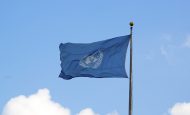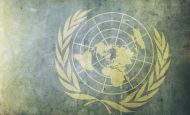Submission to Human Rights Council on Abuse of Human Rights Defenders Status
Full Article
Click to view the official submission.
The Office of the High Commissioner for Human Rights (OHCHR) defines human rights defenders (HRDs) as “people who, individually or with others, act to promote or protect human rights.” OHCHR explains that individuals must accept the universality of human rights and partake only in peaceful action in order to be considered HRDs. Importantly, according to the definition, an individual may not be considered a human rights defender if he or she denies “some human rights” but claims “to be a human rights defender because he or she is an advocate for others.”
In practice, unfortunately, the OHCHR and rapporteurs operating under special procedures mandates have failed to ensure adherence to this definition, abusing the term and giving the impression of a UN imprimatur on individuals that promote incitement, violence, discrimination, and virulent antisemitism. Moreover, several individuals and organizations labeled as “human rights defenders” have links to terrorist organizations. In addition to being an abhorrent distortion of the concept of a “human rights defender,” backing for such individuals by UN officials stands in direct conflict with Security Council resolution 1373, which prohibits both direct and indirect support for terrorism.
The concept of HRDs was highlighted at the 34th Session of the UN Human Rights Council especially in relation to the Arab-Israeli conflict. In particular, Special Rapporteur Michael Lynk repeatedly and falsely demonized Israel as non-democratic for supposedly attacking HRDs and interfering in their “human rights” work. However, many of the individuals and NGOs cited by Lynk cannot be considered HRDs by any interpretation of the term and reflects the promotion of a disturbing ideology rather than human rights.
The most egregious case involves Manal Tamimi, described in Lynk’s report as a “leader of the protest movement in the Palestinian village of Nabi Saleh” and claiming she engages in “non-violent activity.” Yet, Tamimi’s Twitter feed is replete with virulently antisemitic imagery and incitement to violence. For example, on August 1, 2015, Tamimi wished for a “third intifada” and for people to rise up and kill “all these Zionist settlers everywhere.” On December 8, 2016 she similarly tweeted that “we will keep resisting until the last Zionist either got killed or leave Palestine.”1
Only after a complaint was filed by the Amuta for NGO Responsibility, did OHCHR remove her from the edited version of Mr. Lynk’s report. Mr. Lynk, however, did not offer any apology for this incident, and significant concerns remain regarding the process that led to Ms. Tamimi’s inclusion in this report in the first place and whether checks were enacted to prevent future occurrences.
Mr. Lynk’s report also included several individuals who have been indicted and currently on trial for terrorist activity or who have links to terror organizations. In no way can individuals associated with terror organizations be considered defenders of human rights.
For example, Lynk lists Mohammed el-Halabi as an HRD, while at the same time acknowledging that “In June 2016, the Israeli military arrested Mohammed el-Halabi, the director of World Vision’s Gaza operations, on charges that he had diverted large amounts of aid money to the military wing of Hamas.” Mr. Lynk included el-Halabi as an HRD without awaiting the outcome of the trial, made unproven allegations about the Israeli justice system, and solely relied on self-serving statements issued by el-Halabi’s employer World Vision.
In addition to Hamas, several other individuals listed by Lynk have ties to the PFLP terror organization.
Mr. Lynk also included several individuals who are proponents of discriminatory anti-Israel BDS. Because BDS fundamentally singles out and targets Jews alone for exclusion and rejects the rights of Jews to self-determination and sovereign equality, BDS is considered by leaders around the world to be antisemitic. Again, according to the OHCHR definition, someone may not be considered a “human rights defender” if he or she denies “some human rights” but claims “to be a human rights defender because he or she is an advocate for others.” BDS proponents are therefore barred from consideration and should not be promoted by UN officials as human rights advocates.
Recommendations:
In order to prevent future exploitation and abuse of human rights terminology OHCHR must:
- Independently research and verify claims made by those seeking human rights defender status, especially those operating in conflict zones. (For instance, a simple search by Lynk and the OHCHR staffers that assist in writing his reports would have revealed the disturbing rhetoric and activities.)
- Ensure that OHCHR and UN Special Rapporteurs consult a broad variety of source material in preparing their reports, rather than simply parroting claims from an exceedingly narrow set of actors. Materials received from groups or individuals affiliated with terrorist organizations should not be considered as credible source material.
- Judiciously employ terms like “Human Rights Defenders” for those who actually merit the label.


